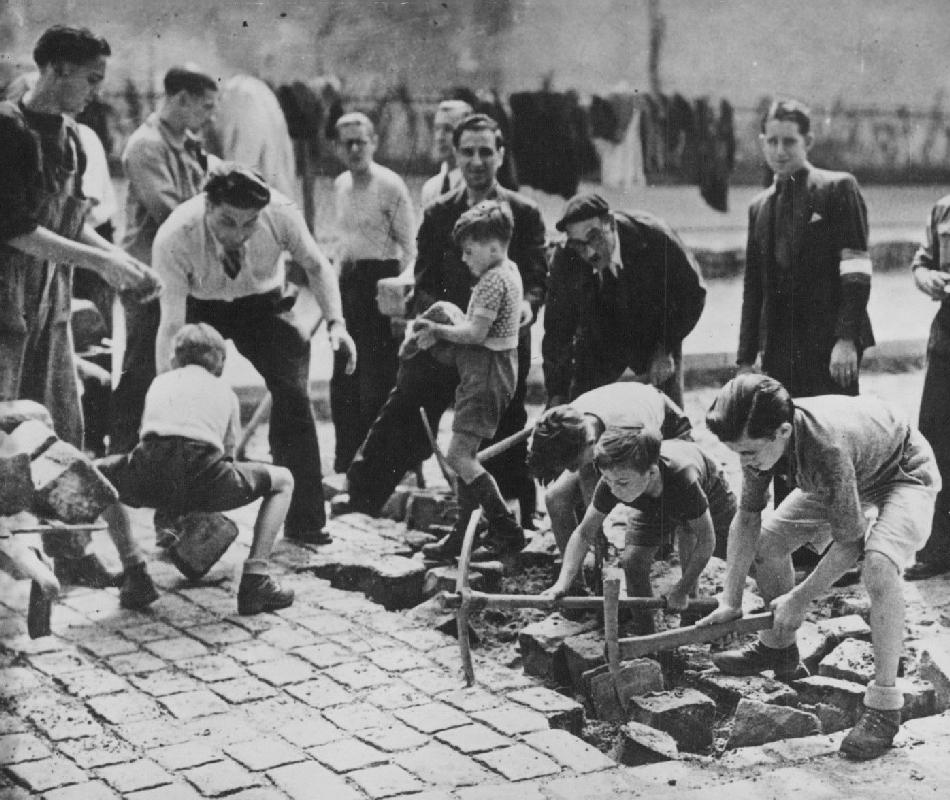
The Liberation of Paris: Paris Rises (August 18, 1944)

Figure 1.--A long standing Parisian tradition in time od crisis is digging up the cobblestones to build barricases. The Germans as the Allies appoached withdrew into defendable areas. The Police were no longer going to challenge the FFI. Thus on August 18 with a general strike declared, the barricades began to go up. The press caption read, "Members of the French F.F.I. are helped by their sonsin removing paving blocks from a street in Paris to build barricades from which they fought for the capital's liberation." This was the American intrpretation. we do not believe all the boys pictured here were sons of the FFI fighhters. The Germans were thoroughly hated. Many boys would be delighted to help wehter their father or brother were in the FFI, along as mother let them. The barricades were needed becausee the Germs had tanks and heavy weaons, the FFI did not. The fct tght children this age were involved shows that the Germans were not contesting control of the streets.
|
|
Parisians as best they could by listening to the BBC and Free French broadcasts followed the Allied breakout from Normandy. It was clear that the Germans were withdrawing from France and that Allied armies were approaching the Seine east and west of Paris. Thge FFI presence in the city becamne more brazen. The first action in Paris was the Paris Métro, Gendarmerie and Police going out on strike (August 15). The postal workers followed (August 16). Finally a general strike broke out (August 18). Parisians began to mobilize and the barricades began to go up. The FFI had only small arms and limite quantitoes of of amunition. The French resistance without instructions or any coordination from the approaching Allied commanders launched the liberation of Paris. Parisians had earlier meekly surendered and agreed to collaborate. Now with a taste of German rule, a tortured city once a symbol of freedom rose up to break the chains of occupation and reclaim its freedom and dignity. [Neiberg] Allied armies were headed north, but not directly toward Paris. The effort to libeate the city could well have resulted in its destruction. The Americans and British were primarily focused on the retreating German armies. The French were divided. Political groups competed for cntrol of the Paris resistance. To the South, General DeGualle and his Free French were attempting gain contol of the Resistance and direct it. This was a difficult undertaking given that the Communists were such an important part of it. It was a struggle for who would control France after liberation from the Germans. As the German Army retreated north, a few heavily armed units in Paris held on to the city.
Source
Neiberg, Michael. The Blood of Free Men: The Liberation of Paris, 1944 (2012), 352p.
CIH -- WW II

Navigate the CIH World War II Section:
[Return to Main liberation of Paris page]
[Return to Main liberation of France page]
[About Us]
[Biographies]
[Campaigns]
[Children]
[Countries]
[Deciding factors]
[Diplomacy]
[Geo-political crisis]
[Economics]
[Home front]
[Intelligence]
[POWs]
[Resistance]
[Race]
[Refugees]
[Technology]
[Totalitarian powers]
[Bibliographies]
[Contributions]
[FAQs]
[Images]
[Links]
[Registration]
[Tools]
[Return to Main World War II page]
[Return to Main war essay page]
[Return to CIH Home page]
Created: 5:17 AM 12/6/2015
Last updated: 5:17 AM 12/6/2015



